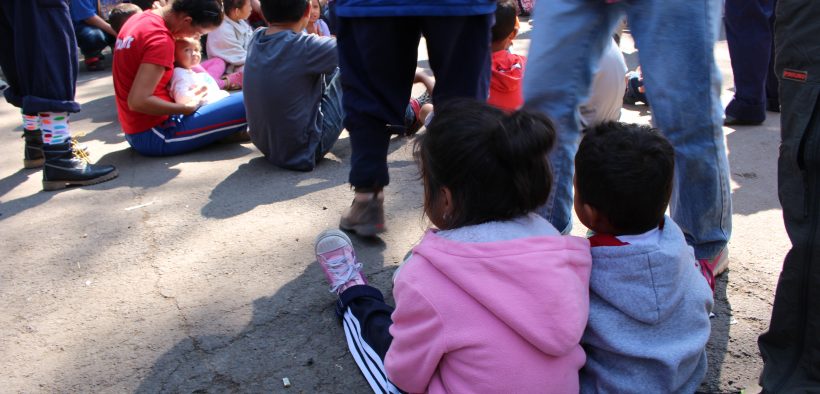Trump Administration To Use Former Japanese Internment Camp For Migrant Children

“We are in a full-blown emergency, and I cannot say this stronger, the system is broken.”
The Trump administration is reportedly planning on keeping more than a thousand detained children in a military base that was used as an internment camp for Japanese Americans during World War II.
The news comes only a week after the Department of Homeland Security’s Office of the Inspector General released a report detailing the “egregious” conditions of multiple detention facilities, drawing an outcry from observers who consider the president’s hardline immigration agenda inhumane and anti-American.
“Because we observed immediate risks or egregious violations of detention standards at facilities in Adelanto, CA, and Essex County, NJ, including nooses in detainee cells, overly restrictive segregation, inadequate medical care, unreported security incidents, and significant food safety issues, we issued individual reports to ICE after our visits to these two facilities,” said the Inspector General’s report.
11,000 unaccompanied children arrived at the border in May alone, and 40,900 were detained in the four previous months of 2019, according to Time. The Trump administration has chosen to send unaccompanied children to Oklahoma City’s Fort Sill, a former internment camp that housed an estimated 120,000 Japanese Americans stripped from their homes during World War II, because of the overwhelming scale of the crisis.
Trump Not the First to Use Former Internment Camps
The Obama administration also kept thousands of children at Fort Sill for four months in 2014, but the problem has drastically worsened since the former president left office. As Acting Customs and Border Patrol Commissioner John Sanders described, “We are in a full-blown emergency, and I cannot say this stronger, the system is broken.”
While the usage of former internment camps is not unique to President Trump, critics view it as particularly symbolic under an administration that has taken an immigration stance many consider to be unnecessarily cruel.
The Trump administration recently announced it would cut English lessons and playground access for unaccompanied children, saying it would “begin scaling back or discontinuing awards for U.A.C. (unaccompanied minor) activities that are not directly necessary for the protection of life and safety, including education services, legal services, and recreation.”
Detention For Profit
But while the Trump administration argues it does not have enough funds to provide decent living conditions to detained children, critics point to the lucrative contracts private companies have gained from the zero-tolerance agenda of the administration.
In 2018, the federal government spent $7.4 billion on immigration detention and processing, with private prison companies like GEO Group and CoreCivic being top beneficiaries from the surge in spending. GEO Group and CoreCivic “received boosts of $85 million and $121 million respectively” in federal contracts over the past four years, according to Bloomberg Government. Meanwhile, major banks like JP Morgan and Wells Fargo provided hundreds of millions in loans to the private prison industry, until being forced to divest from public outcry.
“The immigration system is used as a vehicle to extract wealth from communities, or at the very least as a vehicle to launder taxpayer money into the private sector,” Bianca Tylek, director of the Corrections Accountability Project, told In These Times.
GEO Group and CoreCivic’s stocks surged 100% after Trump’s election, and both have been generous campaign donors to the president. These private companies, along with nonprofits like Southwest Key Programs (which received $626 million in federal grants in 2018), have faced frequent allegations of inhumane treatment of migrants, and critics say the government has provided little to no oversight.
Abuse of Migrants
According to a report from The Intercept, more than 1,200 allegations of sexual assault at both public and privately run adult detention facilities were filed between 2010 and 2017, and police reports indicate hundreds more incidents victimizing children. One HIV-positive worker at Southwest Key was charged in August with molesting at least eight minors; other Southwest Key cases involve children as young as 6. “If you’re a predator, it’s a gold mine,” said one psychiatrist.
Unconfirmed reports of suicides and deaths in custody cap off the grim scene, wrote investigative journalist David Dayen.
Former Department of Homeland Security Secretary John Kelly is a recent example of the revolving door between the immigration crackdown and the private contractors paid to facilitate it. Kelly is now advising Caliburn International, which manages Comprehensive Health Services, Inc., a company that runs multiple child detainment facilities. According to CBS News Kelly will advise the company, which could receive $340 million in federal funding over 6 months, specifically on child detention.
Sen. Elizabeth Warren and Rep. Pramila Jayapal sent an open letter to the CEO of Caliburn requesting more information on Kelly’s appointment.
“It is disheartening that General Kelly, with his decades of public service, used his position to implement such cruel policies and then left the government to profit from them, and we are disappointed that General Kelly has ignored requests that he resign from the Caliburn Board of Directors,” the lawmaker wrote.
Andrea Pitzer, the author of “One Long Night,” a book about the history of concentration camps, believes the Trump administration’s policies will continue to worsen.
“They don’t seem to have a plan on how to deal with this, other than to punish the refugees, the asylum seekers,” Pitzer told MSNBC.
“I expect to see contagious diseases, malnutrition in some cases, and mental health crises,” Pitzer said. “We’re going to have that very soon; there might be reports already coming of that.”











